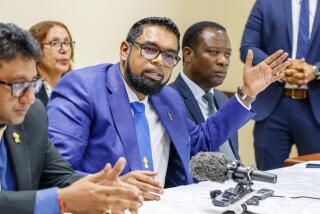COLUMN LEFT : To Seal Peace, Stop Aiding the Armies : Lofty rhetoric won’t send the generals back to their barracks in Central America.
Long the deep pockets for friendly, anti-communist armies in Central America, Washington now would like to curtail that drain on the Treasury. But Washington is hesitant, fearing the effect on the status quo, especially the showcase civilian governments. The fact is, building real democratic governments in the region requires an unequivocal U.S. commitment to reduce the size of their armed forces.
The excessive levels of armed forces in Central America has long been a cause for concern. The so-called Contadora Group of Latin nations negotiated formulas for reductions as part of the first Central American peace plan several years ago, but there are 40 times more troops in the region today than a decade ago.
The raison d’etre for these bloated military structures is less persuasive than ever. Defense needs are slight, with no extra-regional threat in sight. And the civil conflicts that raged in the region during the 1980s are either ended or in negotiation.
Conditions are excellent for arms reduction. The Central American presidents, with Panama now included, recognized this at their summit in June when they agreed to take up “in an urgent manner” security issues and mutual arms reductions. Their confidence has deepened after three years’ experience in regional forms of cooperation through the Arias (or Esquipulas) peace process. They resolved to face the critical problem of relieving their debt-ridden budgets by cutbacks in burdensome military spending.
At least the civilian heads of government were so inclined. Their vice foreign ministers made significant progress, meeting for the first time as the Central American Security Commission in Costa Rica on July 31. They agreed to inventory their force strength by commonly accepted measures, and to call on experts of the United Nations and Organization of American States to assist in ongoing negotiations on force cutbacks.
But it would be naive to think that the military commands were in the barracks waiting to hear the results of this important initial negotiation. By long tradition, the generals (except in army-less Costa Rica) have held power, or have been the power behind their governments. Not surprisingly, at the July 31 meeting top military commanders were personally in attendance, “advising” their foreign ministries. Their very presence suggested the challenge that the civilian governments face if they threaten the enormous vested interests, both political and economic, of the brass.
The Bush Administration is doing the right thing--or half of the right thing. In a July memo to the Central American governments, the State Department conceded that “the size of national forces has contributed significantly over the decade to regional insecurity,” and endorsed “smaller, apolitical and professional forces.”
But while Foggy Bottom gives this message to the civilian governments, Washington continues to provide more than $300 million in security assistance to the region annually. And, in addition to its Southern Command in Panama, the Pentagon has military advisers throughout the region and maintains at least 1,000 U.S. troops at the Soto Cano military base in Honduras--part of our own 1980s military build-up in the region.
A double message from Washington won’t do; it will be read as tacit support for our long-time military cohorts. To give the civilian governments the strength they need, the Bush Administration must demonstrate a clear policy choice.
In addition to continued support for the arms negotiations under way, the United States should lead with our own arms reduction. The first step should be withdrawal of U.S. troops from Honduras--a demand expressed by Contadora and echoed by the Central Americans in July. Then, Washington should cut back its large infusion of military aid, which is unjustifiable for reasons of defense and is used primarily to bankroll a military mandarin class.
Washington’s decision to support civilian over military claims on U.S. largess could be the single greatest impetus for rapidly achieving arms reduction in Central America and promoting long-term democratic development.
More to Read
Sign up for Essential California
The most important California stories and recommendations in your inbox every morning.
You may occasionally receive promotional content from the Los Angeles Times.










